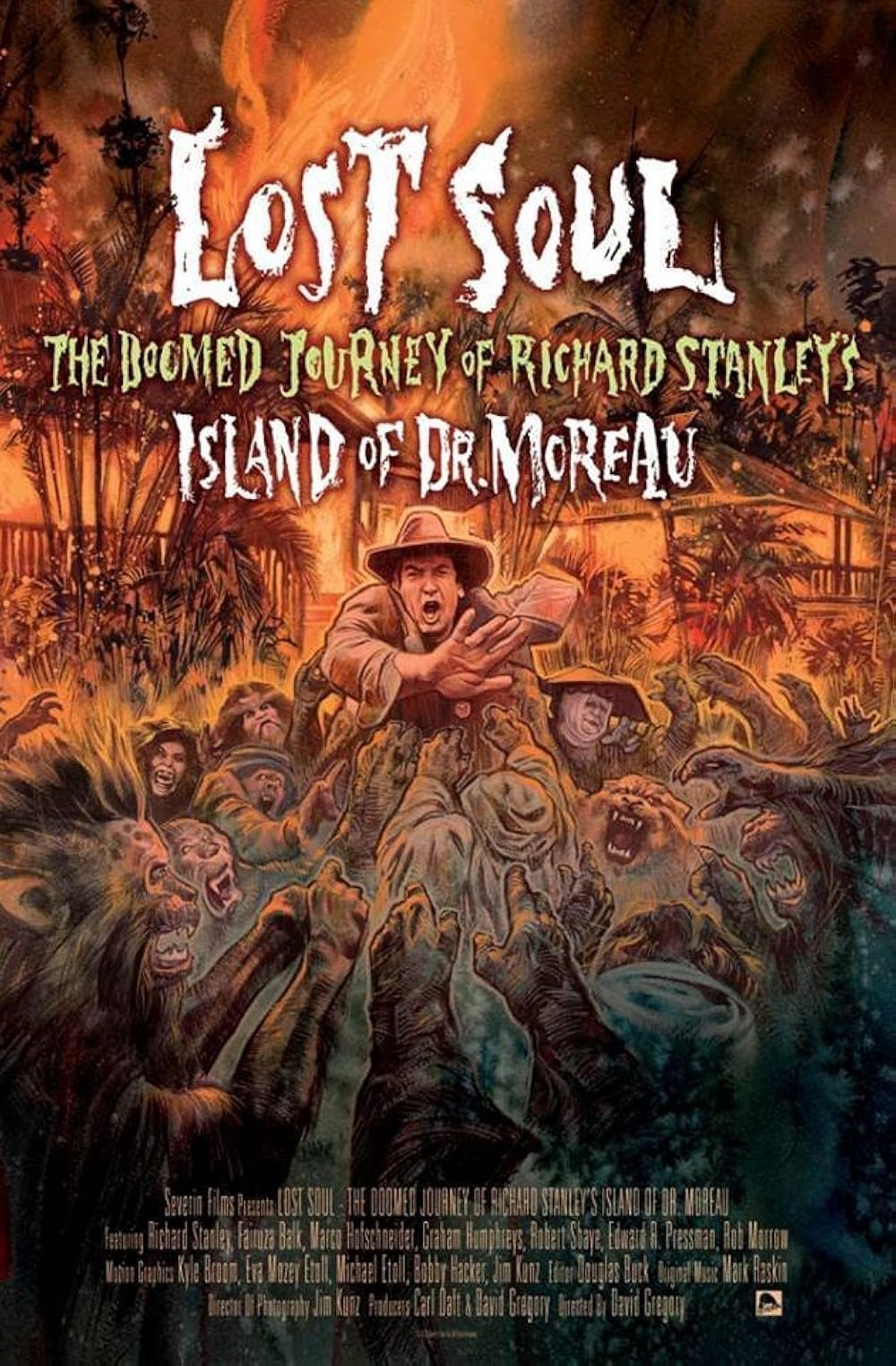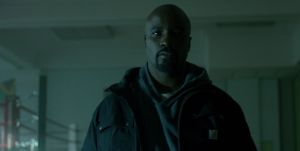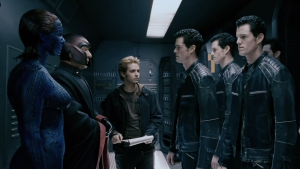
DwC talks to Richard Stanley. This is big. This is awesome. For those who are unfamiliar, Richard Stanley is the man behind the 1990 steam-punk cult classic, Hardware, the 1992 hallucinatory fever dream, Dust Devil, and 2019’s gloriously psychedelic, Color Out of Space.
In 1996 he was slated for the big-budget remake of The Island of Dr. Moreau before being caught in a perfect storm of apocalyptically bad weather and having to deal with two of the biggest and most notoriously difficult movie stars of all time, one of whom was spiraling off into irretrievable eccentricity, and the other having just reached the zenith of his ego-maniacal douche-baggery.
When four days of torrential rains prevented him from shooting a single frame of film, the producers stepped in and removed Stanley, replacing him with John “I’m just here for a paycheck” Frankenheimer. What the studio proceeded to churn out is now regarded as one of the worst films of all time, not to mention a missed opportunity of gargantuan proportions, as Stanley’s vision for the film was truly spectacular.
The entire ordeal was captured in the excellent documentary, Lost Soul: The Doomed Journey of Richard Stanley’s The Island of Dr Moreau.
Stanley would spend the next several years writing screenplays and directing short films before exploding back onto the scene via a three-picture deal with Elijah Wood’s production company, SpectreVision, beginning with the brilliant Color Out of Space, starring Nicholas Cage.
After the film garnered rave reviews from critics and rampaged its way to the top of the streaming charts, it seemed like Stanley was back and better than ever.
Misfortune would rear its ugly head once again, however, when Stanley’s ex-girlfriend/former writing partner accused him of physical abuse, an allegation that was backed up by a second individual who claimed to have witnessed said abuse firsthand.
This was in 2021, when all it took to destroy a career was a vague allegation on Twitter, and boy, did it ever (almost) ruin Stanley’s. Within hours of being made public, Stanley’s picture deal was terminated, and it seemed as though he was finished for good.
Stanley on set
But Stanley refused, as Dylan Thomas would say, “to go gentle into that good night,” and fought back against his accuser in a French court where her story quickly fell apart.
Stanley was vindicated in 2022 when all charges against him were dropped, and in turn his accuser found herself facing several charges under France’s penal code. She then quickly left the country to avoid the trouble of facing French law enforcement.
Things had been quiet with Richard Stanley since his victory. Quiet, that is, until a couple of weeks ago. While attending the Rhode Island Film Festival, Stanley announced that he was getting back into the director’s chair for an adaption of another beloved H.P. Lovecraft tale, The Dunwich Horror, a delightfully twisted yarn that sees the evil “wizard” Whately make a deal with a malevolent deity, receiving a lifetime of riches in exchange for offering up his own daughter to bear the offspring of this being.
That offspring, Wilbur, is a half-human, half-deity whose purpose is to bring about the destruction of mankind and make way for the return of “the Old Ones.” But Wilbur also had a twin brother, the titular Dunwich Horror. After Wilbur is killed trying to steal the infamous Necronomicon, this twin brother, who much more closely resembles their father, escapes and wreaks havoc upon the unsuspecting populace of Dunwich. It’s a fantastic story.
Fresh from his trip to Rhode Island to scout filming locations and attend the film festival, I was lucky enough to have a brief conversation with Richard about his upcoming film, Dunwich…
DwC: Can you tell me how the Dunwich project came about?
RS: H.P. Lovecraft was my mother’s favorite author and I guess she raised and trained me to adapt his material to the screen in much the same way Sarah Conner trains her kid to fight Terminator robots; the desire to adapt The Dunwich Horror to the screen first began to germinate in my consciousness as a child when I first viewed the disappointing Dan Haller adaptation in the far off summer of 1970.
The story’s quasi-human anti-hero, Wilbur Whately, is surely among the most fascinating characters to have sprung from the master’s pen, and along with the other members of his shunned family, richly deserves to be reintroduced to modern audiences.
DwC: How far along are you on the production side?
RS: The film will be produced by Ace Pictures Entertainment in collaboration with Side Street Studios. The Ace group were the principle backers of Color Out of Space in 2019, which was one of the most viewed stand-alone sci-fi horror features on Netflix during the Covid lockdown and currently serves as proof of concept.
We intend Dunwich to be the first major adaptation of Lovecraft’s work to be shot on location in his native New England with post-production scheduled to take place in Rome. The project will be overseen by producers Peter Wong, John Fessler, and Reshad Kulenovic.
We are currently casting, locking down locations, and working to visualize Lovecraft’s world in a way that has never been felt before.
DwC: I understand your adaptation of Lovecraft’s classic will be broken into two films. Do you intend to shoot both films back-to-back?
RS: The two films will share locations and VFX assets as well as feature three returning cast members. The first installment, which we intend to shoot in Rhode Island next summer, concerns the childhood of Wilbur Whately and the macabre history of his backwoods community, whereas the second feature deals with the ‘Dunwich Horror’ itself and is more action and FX-orientated, coming across on paper as a sort of hysterical occult kaiju thriller turned monster hunt.
I hope to shoot both features as close together as possible, if only to prevent our younger cast members from aging too visibly between productions, although it will be impossible to make a final call on this until all the deals are inked.
DwC: Will it be set in present day, or will it be a period piece?
RS: One of the many joys of splitting Dunwich into two epic installments is that we have been granted the opportunity to tease out the implications of Lovecraft’s narrative to weave a spell that spans the centuries, from witch hunts of the 17th century to the near future as humanity staggers to the brink of extinction.
H.P. Lovecraft
Nor does the narrative unfold in a strictly sequential order, presenting a vision of New England in which the present day and immediate future is inextricably intertwined with a shadowy, all but forgotten past.
DwC: Is this a continuation of your planned trilogy that began with Color Out of Space, or have you hit the reset button on that?
RS: I’m proud to announce that I have indeed hit the reset button on the franchise. This is an entirely new adaptation of Lovecraft’s classic that I believe hews far more closely to the source material. While Color Out of Space was a critical success, the unethical and, frankly, criminal actions of certain individuals involved in that production forced me to step away from the franchise and seek new sources of funding.
Front of house interference with the creative process forced me to tone down some of the material in Color Out of Space to make it more palatable to mainstream audiences, a decision I have always regretted.
Elements, such as the fate of the family dog and the degradation of the younger members of the family, were deemed too horrific to include in the final cut, and the use of infrasound and licensed black metal tracks on the original soundtrack were mixed so far back without my consent or authorization as to become all but negligible on the US release, denying the audience the full intensity of the experience.
By stepping away from Hollywood and raising the funding for Dunwich entirely from private equity and foreign investment, we hope to deliver a completed film that is ultimately more faithful to Lovecraft’s vision.
DwC: Speaking of criminal actions; can you comment on your legal battle in 2021?
RS: The legal battle against my internet accusers came to trial in 2022 when the high court in Carcassonne, France, my adopted homeland, found I had no case to answer to. The vindictive charges laid against me were found to be without evidence or merit, and criminal charges of libel, harassment, loss of income, and degradation of working conditions were upheld against my accusers.
Two feature projects and a popular television series were canceled because of their actions, resulting in the loss of hundreds of jobs and millions of dollars in potential revenue. Both my accusers are California residents and are protected by the three-month statute of limitations on internet libel, making it all but impossible to pursue them or the companies that initially supported them through US courts.
The motivation of the so-called ‘777 attack’ remains opaque, but there was an ideological component, placing these unhappy events within the context of a wider cultural war targeting prominent figures in the occult community.
While these truly nightmarish circumstances proved a drain on my time, energy, and financial resources, they were not without a silver lining. I got to find out who my true friends were, and met my fiancée, Simone Gross, making these last two years the happiest I have known.
Now that this unprovoked and unwanted conflict is finally over, I look forward to refocusing my energy on what I believe I was placed on this Earth to do, namely, adapting H.P. Lovecraft’s work to the screen.
DwC: Has the casting process begun yet?
RS: The casting process has indeed begun, and we have secured our senior leading man, although industry protocol forbids me from naming names. In the meantime, the hunt is underway to find a fresh young talent capable of embodying Lovecraft’s antihero, Wilbur Whately, a half-human teenage warlock who sets out to murder the world.
I believe our project will sink or swim on the basis of Wilbur’s casting.
DwC: When can we expect to see Dunwich?
RS: Like Wilbur Whately, Lovecraft fans are used to being patient. Given the current rate of progress, the first installment of this long-awaited saga will not reach auditoriums or streaming until the fall of 2026.
DwC: Is there another Lovecraft adaptation planned after Dunwich wraps? If so, can you tell us what it is?
RS: Like all too many folks these days, I have dreams about Cthulhu. Call it a sign of the times. Let’s see what the future holds and the Old Gods intend.
Some truly wonderful fan art from Reddit
DwC: Richard, I can’t thank you enough for taking the time to chat with me about Dunwich. Before we wrap up, are there any other details about the film you can provide?
RS: Since its creation in the nineteen twenties, Lovecraft’s mythos has spread across the world and through all aspects of the media like a psychoactive virus. Cthulhu and the Necronomicon have brand recognition as far afield as Russia, Africa, and Japan, yet the mythos operates wholly outside of copyright with all of Lovecraft’s work effectively in the public domain.
No corporate giant can own or trademark Cthulhu. He, she, or it belongs to all of us, and I firmly believe the future belongs to Cthulhu. I truly hope my own efforts on Dunwich serve to turn the key by bringing Yog Sothoth to your living room and opening the gates for the Old Ones and all the other projects still in the pipeline…
DwC: So, there you have it ladies and gentlemen: The Return of Richard Stanley. Fall, 2026: Dunwich. I’m just gonna go start crossing the days off my calendar…
Richard Stanley and his fiancé, Simone Gross, at the 2024 Rhode Island Film Festival
The post An Exclusive Interview With Richard Stanley appeared first on Last Movie Outpost.



